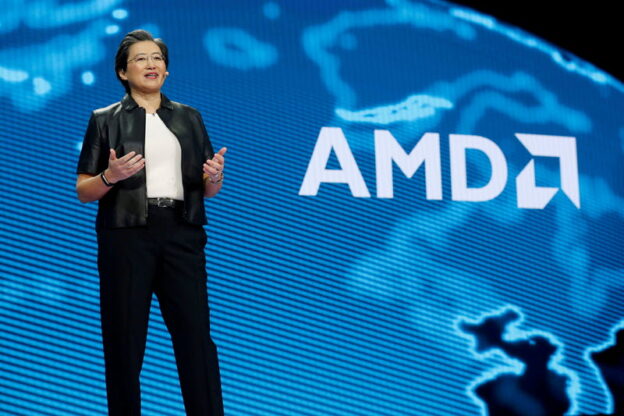The chip designer confirms to CRN that it has acquired the employees of Untether AI, a developer of AI inference chips marketed as faster and more energy-efficient than rival products for edge environments and data centers.
AMD confirmed Thursday that it has acquired the employees behind Untether AI, a developer of AI inference chips marketed as faster and more energy-efficient than rival products for edge environments and enterprise data centers.
“AMD has entered into a strategic agreement to acquire a talented team of AI hardware and software engineers from Untether AI,” an AMD spokesperson told CRN in a statement.
“The transaction brings a world-class team of engineers to AMD, focused on advancing the company’s AI compiler and kernel development capabilities as well as enhancing our digital and SoC design, design verification, and product integration capabilities. We are excited to welcome the team’s unique expertise to AMD,” the representative added.
The AMD spokesperson declined to disclose financial details of the deal.
A statement sent by Untether AI executive Bob Beachler said the startup “will no longer be supplying or supporting our speedAI products and imAIgine software development kit” as part of the transaction.
“While today marks the end of Untether AI’s journey, we are proud of the pioneering research that underpinned our work in advancing state of the art AI chip technology,” the statement read. “We are grateful for the dedication of our team and the support of our customers, partners, and investors. We look forward to the contributions our world-class team will make with AMD.”
This is the latest of several acquisitions AMD has made over the past few years to expand its AI computing capabilities and challenge Nvidia’s dominance in the field. Just a day before, the company announced that it had acquired compiler startup Brium to optimize AI performance on the chip designer’s Instinct data center GPUs, among other things.
The Untether AI news was first shared on LinkedIn by Justin Kinsey, president of SBT, a Phoenix, Ariz.-based recruitment firm focused on the semiconductor industry.
Chris Walker, a former Intel executive who became Untether AI’s CEO early last year, left the startup in May, according to his LinkedIn profile.
Walker did not respond to a request for comment.
Founded in 2018, the Toronto, Ontario-based startup had been selling AI inference chips for edge environments and data centers based on its “at-memory” architecture that it said “dramatically” improved performance and reduced power consumption.
“We’ve proven that when you reduce data traffic in the chip, you’re improving both throughput and energy efficiency, and so the difference between what you need to do [at the edge or in a data center], it’s really more about how many rows and columns do we put down in the memory interface,” Walker told CRN in an April interview.
Last October, the company launched its speedAI240 Slim AI inference accelerator card, which it said demonstrated three times greater energy efficiency than other chips in the closed data center category and six times greater energy efficiency in the closed edge category for peer-reviewed MLPerf test results released months earlier.
The speedAI 240 also exhibited the fastest performance of any single PCIe card in the data center and edge categories for the ResNet-50 image classification benchmark, it said.
Untether AI said the speedAI240 card, which was available in a 75-watt PCIe design, had already been adopted by U.S.-based rugged embedded computing provider J-Squared Technologies and India-based AI cloud computing firm Ola-Krutrim.
Months before, the chip designer announced a “multi-faceted partnership” with Ola-Krutrim that included the “co-development of Untether AI’s next-generation data center solutions.”
The company had partnerships with several other companies, including semiconductor companies like Ampere Computing, Arm and NeuReality, plus solution providers such as Boston, Asa Computers and Vertical Data.
In his April interview with CRN, Walker said “there’s a strong appetite” for Untether AI’s chips, particularly because of the need for processors that don’t consume as much energy as Nvidia’s energy-hungry GPUs that are pushing racks to 120 kilowatts.
“I think we haven’t even scratched the surface yet of AI really being deployed in either industrial edge or enterprise applications where [there are] tens of thousands of small data centers that are power constrained,” he said.
https://www.crn.com/news/components-peripherals/2025/exclusive-amd-acquires-team-behind-ai-chip-startup-untether-ai





